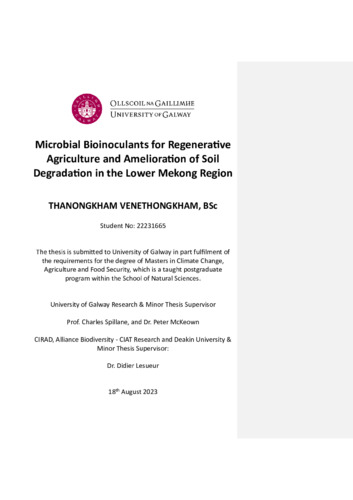Microbial bioinoculants for regenerative agriculture and amelioration of soil degradation in the Lower Mekong Region
The lower Mekong region, encompassing Laos, Thailand, and Vietnam, heavily relies on agriculture for livelihoods. However, both the historical and current agricultural systems face a plethora of sustainability challenges, including in relation to the health of soils to support agricultural production and livelihoods. To improve the sustainability of agricultural systems, nature-based solutions in the form of microbial bioinoculants are being combined with agroecology principles as approaches to improve soil health. This review investigates the current status of microbial bioinoculants and agroecological practices in the region, and their combined potential for regenerative agriculture and soil restoration. We find that microbial bioinoculants, functioning as biofertilizers for nitrogen fixation, P and K solubility, and for promoting plant growth (e.g. rhizobacteria), along with genera that function as biocontrol agents, are available in the lower Mekong region market. However, microbial bioinoculants, while beneficial, are insufficient on their own to enhance soil health. For optimal performance, microbial bioinoculants rely on favourable agroecological environments and niches for survival and reproduction. Hence, we explore the potential for agroecological principles to be applied to increase the efficacy and impact of microbial bioinoculants, especially for improving soil health. There are a range of agroecological practices underway in the lower Mekong region, which include; inter alia, organic farming, conservation agriculture, agroforestry, and integrated pest management. There are a number of research and trial projects which are showcasing successful combinations of microbial bioinoculants and agroecological practices for major crops. Among the three countries, Thailand has the most intensive research and supportive policies for combining microbial bioinoculants with agroecological principles, followed by Vietnam, which receives support from a range of international organizations but lacks specific standards for microbial bioinoculants. Laos has some experience in implementing agroecological practices but is relatively new to adopting microbial bioinoculants within its agricultural systems. There are a wide range of knowledge gaps which present a challenge for more complete understanding of what potential (or not) microbial bioinoculants have for improving agricultural systems (including soil health) through combining with agroecological principles. Future research efforts could usefully assess the efficacy and impact of different microbial bioinoculants, when combined with agroecological principles for improving the sustainability agricultural systems and livelihoods in the region

